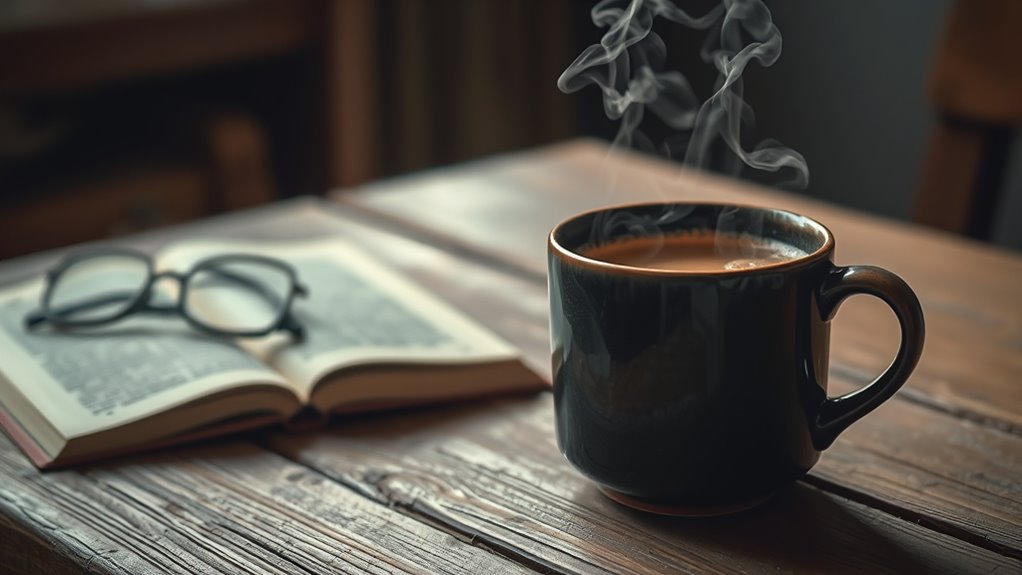Coffee impacts your mind and emotions by boosting alertness and focus, making you feel more energized during mental tasks. It can also elevate your mood and help reduce stress or anxiety in moderation, fostering feelings of happiness and social connection. Coffee’s taste, aroma, and cultural significance add to its comforting and stimulating effects. Its psychological influence varies based on individual sensitivity and cultural practices—discover how these factors shape your coffee experience as you explore further.
Key Takeaways
- Coffee consumption enhances alertness and focus, serving as a motivator for mental performance and task completion.
- Drinking coffee often improves mood and fosters feelings of happiness, contributing to emotional well-being.
- Social interactions around coffee, such as gatherings in cafes, strengthen community bonds and shared cultural experiences.
- The taste, aroma, and ritual of coffee provide sensory comfort and psychological satisfaction.
- Individual differences and cultural practices influence coffee’s effects on stress, anxiety, and overall psychological health.

Coffee isn’t just a morning ritual; it’s a powerful influence on your mind and emotions. When you sip that cup, caffeine from coffee acts as a central nervous system stimulant, sharpening your alertness and boosting your focus. It’s no coincidence that many rely on coffee to kickstart their mornings—caffeine helps you perform better on problem-solving tasks and enhances mental clarity.
You’ll notice that your brain’s ability to concentrate improves after a cup, making it easier to tackle complex issues or stay productive. However, while caffeine heightens cognitive abilities and energy levels, it doesn’t considerably boost creativity. Its primary effect is to help you stay alert and attentive rather than inspire new ideas.
Beyond cognition, coffee also plays a role in your psychological well-being. Numerous studies link higher coffee consumption with a reduced risk of depression and suicide, suggesting that your daily coffee intake could contribute to sustained happiness and optimism. The relationship appears bidirectional—meaning, coffee might help elevate your mood, and feeling happier encourages you to enjoy coffee even more.
In moderation, caffeine can also help reduce stress and anxiety, providing a comforting boost that makes you feel more balanced. Chronic caffeine use, however, can have the opposite effect, potentially increasing feelings of anxiety or stress, especially if you consume too much.
Your motivation for drinking coffee often centers around its cognitive benefits. Staying alert and focused is a primary reason, but many also turn to coffee for emotional relief—whether to lift their mood or combat negative feelings like stress or sadness.
The social aspect of coffee can’t be overlooked either; sharing a cup with friends or colleagues fosters connection and community. The taste and aroma of coffee are substantial drivers, turning a simple beverage into a sensory experience that many find comforting or stimulating.
Some individuals also believe that coffee can aid weight control, adding another layer to its appeal.
It’s essential to recognize that caffeine’s effects on stress and anxiety can vary. While moderate consumption may help alleviate minor stress, overdoing it can make anxiety worse, especially for sensitive individuals or young populations.
Gender differences may also influence how caffeine impacts mood and stress levels. Coffee’s social and cultural significance is evident worldwide, with many cultures integrating it into daily routines and social gatherings. Coffee shops serve as communal hubs, fostering interactions that go beyond just drinking.
Health-wise, moderate coffee intake offers benefits such as a lower risk of certain diseases and potentially longer lifespan. The antioxidants in coffee contribute to these positive effects, but excessive consumption can lead to withdrawal symptoms and health problems.
Research also indicates that the effects of caffeine on the central nervous system involve complex interactions with neurotransmitters, which can influence stress and anxiety levels differently among individuals.
Frequently Asked Questions
Does Coffee Consumption Influence Long-Term Mental Health?
You might wonder if coffee affects your long-term mental health. Regular, moderate coffee consumption can boost alertness and reduce depressive symptoms, but excessive intake risks increased anxiety, sleep issues, and dependence.
Over time, heavy caffeine use might worsen mental health, especially if you’re prone to anxiety or sleep problems. Staying mindful of your intake and listening to your body’s responses helps maintain a healthy balance for your mental well-being.
How Does Caffeine Affect Sleep Quality Over Time?
Imagine trying to run a marathon with a heavy backpack; caffeine’s effect on sleep is similar—it disrupts your rest over time. Data shows it reduces total sleep by 45 minutes and delays sleep onset.
Long-term, caffeine shifts your sleep schedule and consolidates wakefulness. You might feel more alert, but your sleep quality suffers, making recovery harder.
Be mindful of caffeine’s lasting impact on your sleep health.
Can Coffee Habits Reflect Personality Traits?
You might notice your coffee habits reveal aspects of your personality. For example, if you prefer hot coffee, you could be more extroverted or traditional.
Meanwhile, iced coffee lovers might be introverted or adventurous. Those who seek high-quality brews may be perfectionists.
Your choices often align with traits like boldness or social tendencies, showing how your coffee preferences can reflect your personality traits and social behaviors.
What Are the Psychological Effects of Decaffeinated Coffee?
Imagine decaffeinated coffee as a gentle breeze that softly lifts your mood and sharpens your reactions. You mightn’t feel the full rush of caffeine, but the familiar taste and ritual still boost your mental clarity and help reduce withdrawal symptoms.
It’s like a comforting whisper that eases your mind and body, offering subtle psychological benefits—less intense than caffeine but still meaningful in maintaining your daily balance.
How Does Coffee Consumption Vary Across Different Cultures?
You’ll notice that coffee consumption varies widely across cultures. In Europe, countries like Italy favor strong espresso, while Scandinavian nations prefer lighter roasts.
In Asia, traditional methods like South India’s filter coffee thrive, blending old and new trends.
Oceania, especially Melbourne, boasts a vibrant café scene influenced by immigrants.
In regions like Turkey and Ethiopia, coffee plays a crucial social and spiritual role.
These differences shape how people enjoy their coffee daily.
Conclusion
So, next time you reach for that morning brew, remember—you’re not just chasing alertness but also fueling a complex web of habits, comfort, and identity. Coffee’s more than just a drink; it’s your emotional security blanket in a mug. Who knew that your daily caffeine fix is really a masterclass in self-deception? Cheers to sipping your way through life’s little psychological puzzles, one cup at a time. After all, what’s life without a little coffee-induced illusion?









